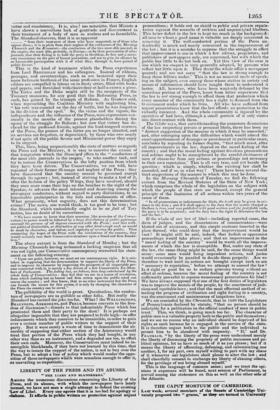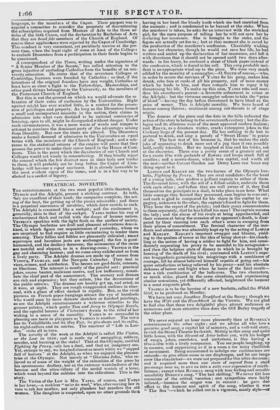THE CAPUT MORTUUM OF CAMBRIDGE.
LAST week; several members of the Senate of Cambridge Uni- versity proposed two " graces," as they are termed in University language, to the tuembess of the Caput. Their purport was to appoint a committee to consider the propriety of discontinuing the subscription required from Masters of Arts to the three ar- ticles of the 36th Canon, and the declaration by Bachelors of Arts that they are bona fide members of the Church of England. Of course these applications were rejected by the Caput of Cambridge. This conduct is very consistent, yet peculiarly unwise at the pre- sent time, when the legal right of some at least of the Colleges to exclude Dissenters from a participation in their funds begins to be questioned. A correspondent of the Times, writing under the signature of " A Senior Member of the Senate," has called attention to the gross injustice of excluding-Catholics from the benefits of an uni- versity education. He states that of the seventeen Colleges at Cambridge, fourteen were founded by Catholics : so that, if the intentions of the original founders have any weight, Catholics at least have as clear a light to the Fellowships, Masterships, and other good things belonging to the University, as the members of the Protestant Church of England. But this is not the ground on which we would advocate the re laxation of their rules of exclusion by the Universities. Right against might has ever availed little, in a contest for the posses- sion of privileges and property. As long as the Dissenters formed a small and unimportant minority in the nation, their claims to admission into what were destined to be national seminaries of learning, open to all, might be disregarded without danger. Under such circumstances, it was a mere waste of words and temper to attempt to convince the dominant party of the advantages arising from liberality. But now the times are altered. The Dissenters make a formal demand of admission to the Universities on equal terms with the members of the Church of England ; and a refe- rence to the statistical returns of the empire will prove that they possess the power to make their cause heard in the House of Cona- n-ions. This is the point which the dignitaries of our Church and .Colleges would act wisely in remembering. If they blindly reject the counsel which the few discreet men in their body now tender to them, it will probably not be long before the Caput of Cam- bridge will become a caput mortuum. It is already insensible to the most evident signs of the times, and is in a fair way to be choked in a surfeit of bigotry.

















 Previous page
Previous page